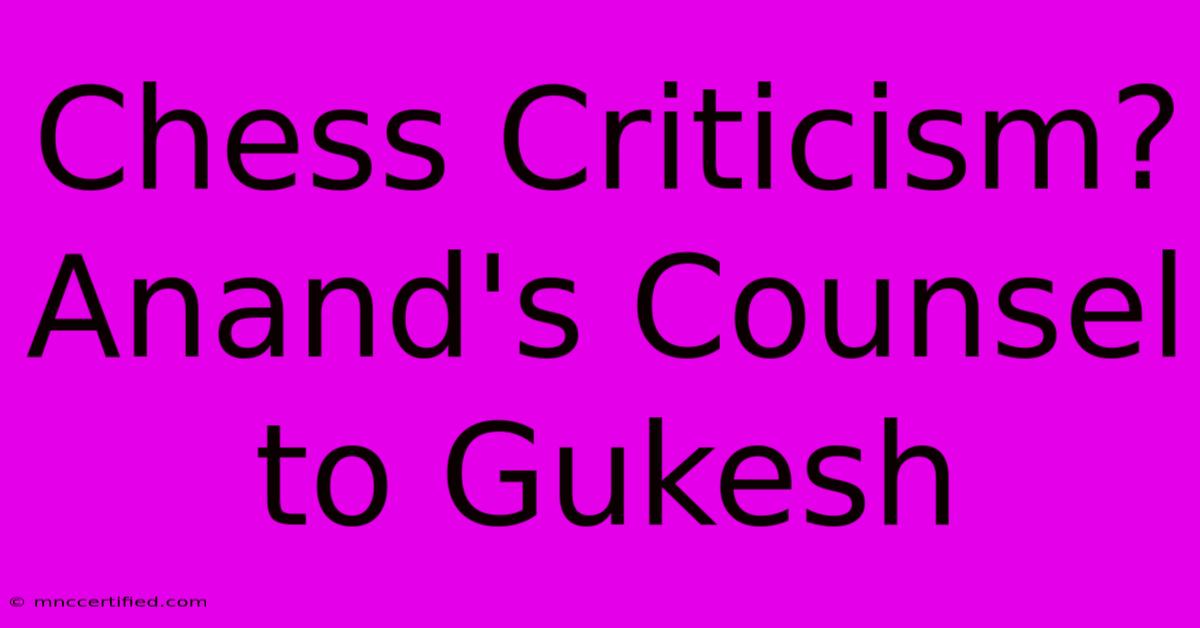Chess Criticism? Anand's Counsel To Gukesh

Table of Contents
Chess Criticism: Anand's Counsel to Gukesh – Navigating the Pressure Cooker
Chess, a game of strategy and precision, also demands immense mental fortitude. While the world marvels at grandmaster victories, the pressure to perform and the sting of criticism are often unseen aspects of a chess player's journey. This article delves into the crucial topic of chess criticism, using Viswanathan Anand's guidance to young prodigy Dommaraju Gukesh as a prime example. We'll explore how to handle criticism constructively and leverage it for growth.
The Crucible of Criticism: Challenges Faced by Young Grandmasters
Young chess prodigies like Gukesh face a unique set of challenges. The intense spotlight, coupled with the high expectations, can be overwhelming. Criticism, whether from commentators, analysts, or even themselves, becomes a significant factor impacting their performance and mental well-being. This pressure cooker environment can stifle natural talent if not managed effectively.
The Impact of Public Opinion and Online Commentary
The digital age amplifies the reach and intensity of criticism. Online forums and social media platforms provide a platform for commentary, both constructive and destructive. While some feedback can be invaluable, the sheer volume and often harsh nature of online criticism can be detrimental to a player's confidence and morale. Gukesh, with his rapid rise to prominence, has undoubtedly experienced this firsthand.
Anand's Wisdom: A Masterclass in Handling Criticism
Viswanathan Anand, a chess legend, is known not only for his exceptional playing skills but also for his insightful understanding of the game's mental aspects. His guidance to Gukesh provides valuable lessons for aspiring chess players of all levels. Anand emphasizes:
-
Focus on self-improvement: Rather than dwelling on external criticism, Anand encourages focusing on one's own game. Analyzing mistakes, identifying weaknesses, and working on specific areas of improvement are key to growth. This is arguably the most important aspect of handling criticism constructively.
-
Ignoring noise: Learning to filter out irrelevant or negative commentary is crucial. Not every opinion holds equal weight, and focusing on constructive criticism from trusted sources is paramount. Anand’s emphasis on this is particularly relevant in the age of instant social media feedback.
-
Learning from setbacks: Chess is a game of mistakes. Losses and criticism are inevitable. The key is to learn from these experiences, adapt strategies, and use setbacks as opportunities for growth. This resilient mindset is essential for long-term success.
-
Maintaining perspective: Anand emphasizes the importance of maintaining a balanced perspective. Celebrating victories and learning from defeats are both vital parts of the journey. This holistic approach helps prevent emotional highs and lows from significantly impacting performance.
Practical Strategies for Handling Chess Criticism
Applying Anand's wisdom, here are some practical strategies for navigating criticism in chess:
- Seek feedback from trusted sources: Identify mentors, coaches, or experienced players whose opinions you value and actively seek their constructive feedback.
- Develop a thick skin: While not ignoring criticism entirely, learn to filter out the noise and focus on relevant feedback.
- Analyze your games objectively: Don't just dwell on the loss; analyze your moves, identify weaknesses, and formulate strategies to improve.
- Practice mindfulness and stress management techniques: Develop strategies to manage pressure and maintain mental equilibrium during tournaments and games.
- Focus on the long-term: Success in chess is a marathon, not a sprint. Consistency and continuous improvement are key.
Conclusion: Turning Criticism into Fuel for Success
Chess criticism, while often unavoidable, can be a powerful catalyst for growth. By adopting a proactive and constructive approach, inspired by Anand's counsel to Gukesh, players can transform criticism into fuel for success. The journey to mastery involves embracing challenges, learning from mistakes, and developing the mental resilience to navigate the pressure cooker of elite chess. The lessons learned extend far beyond the chessboard, offering valuable insights applicable to various aspects of life. Remember: it’s not about avoiding criticism, but about mastering your response to it.

Thank you for visiting our website wich cover about Chess Criticism? Anand's Counsel To Gukesh. We hope the information provided has been useful to you. Feel free to contact us if you have any questions or need further assistance. See you next time and dont miss to bookmark.
Featured Posts
-
Rangers Inferiority Complex Tottenham Celtic Tests
Dec 13, 2024
-
Jerseys Essential Hornet Control
Dec 13, 2024
-
The Game Awards 2024 Key Nominees
Dec 13, 2024
-
Chat Gpt Video Processing Improvement
Dec 13, 2024
-
No Good Deed California Setting
Dec 13, 2024